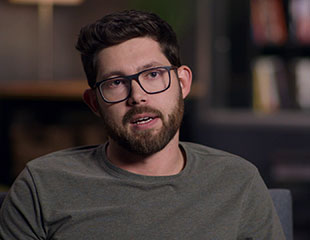"I Couldn't Escape That Anymore"
4-minute read
"I Couldn't Escape That Anymore"
4-minute read
It was the second phone call that stopped Matt in his tracks.
His old Army buddy had called about 15 minutes earlier — he was feeling a little alone and asked if Matt wanted to grab some drinks. “Sure, man,” Matt answered. “I’m a little busy, but maybe tomorrow night?” “Yeah, no worries,” his friend said. And that was that.
Until his friend called back.
“I know you can’t come over. No worries, dude,” Matt remembers him saying. “But I just want you to know, if you ever run into my family or anything, will you just tell ‘em that I love ‘em?”
“I’ll be there in a second,” Matt said.
When he and another friend got to the house, the door was locked. Once they got in, they discovered their friend upstairs, sitting at the kitchen table with a gun.
**
Matt remembers it all so vividly — that night, that kitchen table, that moment.
This was one of his best friends, someone he continues to hold in high regard to this day. They’d been on regular patrols in the Army together. The friend had worn down the cartilage in his ankles, but he never complained — even as bone rubbed against bone. “This is a guy that I have a lot of respect for,” Matt says.
That night, the three friends talked for a while. They finally got the gun away. They got help. But something else happened there too.
“That was a moment that I recognized all those feelings that were within myself,” Matt says, “and they became very real.”
The isolation. The depression.
“This was something that was incredibly vivid, incredibly visceral, and in my face,” he says, “and I couldn’t escape that anymore.” It hit him: Mental health challenges can affect anyone — even a friend he held in such high esteem. And that forced him to look inward.
“To see him go through that?” Matt says. “[It’s like] ‘Dude, you’re my hero, man. You walked every single day without cartilage and you never complained once, man. That’s something. That’s something. And you wanna kill yourself? What … am I doing?’ So that was the first time I really had to address those issues.”
As planned, Matt separated from the Army a short time later. He spent the next year in Austin, attending community college. And drinking a lot. And isolating himself. He went to class, and he went to the bars. “It was fun for a little while,” he says, “but I recognized that I probably needed some help.”
He found that help at a local Vet Center.
“I don’t know if it was dire at the moment,” he says. “But it was me just coming to terms [with] the fact that I need to talk to somebody. And that was a big step for me. It honestly was. Just the realization that … I probably couldn’t do it by myself.”
Through the Vet Center, he began speaking with a Vietnam Veteran — someone who had faced feelings and challenges like Matt’s. Later, when he moved to California, Matt connected with a counselor through VA. “I spent about a year honestly talking to her,” he says, “and I think she saved my life.”
“I just needed somebody to listen to me while I talked and worked it out myself a little bit. And they guided me, of course, and they’ve got a lot of good things to say. But honestly, I just needed somebody who’d ... hear me out.”
There were times when Matt didn’t want to talk. And there were days when he didn’t want to make another appointment. But he stuck with it.
At first, Matt only knew that he felt terrible — like “garbage.” But eventually, he began to gain a deeper understanding. Eventually, he got to a place where he could put a label on what he was feeling, like “isolation.” Once he got there, he could begin to work through it.
**
Recovery doesn’t happen all at once. Matt will tell you that. But he can recognize changes — like talking with his friends and family members, or even strangers. “Not about anything in particular. I was just able to hold the conversation again, which was a big step for me.”
Matt has gone back to school, and he’s working with a student Veteran organization on campus. As he put it: “Things started looking up a little bit.”
As for his advice to others? “Just talk to somebody. See where you’re at and check in with yourself. It’s a really important first step.”
Another important step: finding a community of Veterans.
“Find the local Vets wherever you’re at. … Those are the people that you can talk to. I guarantee you,” he says. “Everybody’s got a little different story. Maybe everybody’s got a little different background. Maybe they’re in a different branch. But those are the people that you can talk to, and they’ll understand, and they’ll be there for you.”

